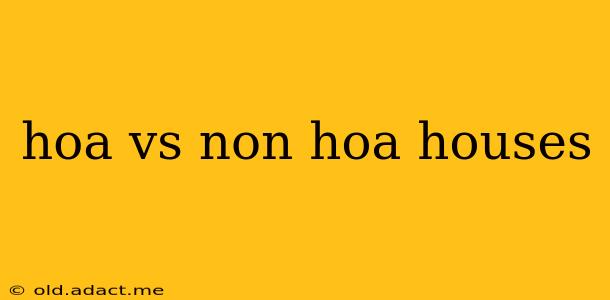Choosing between a house with a homeowner's association (HOA) and one without can significantly impact your lifestyle and finances. This comprehensive guide breaks down the key differences, helping you make the best decision for your needs.
What is an HOA?
A homeowner's association (HOA) is a legally constituted organization that governs a community of homes, typically within a planned development, condominium complex, or subdivision. HOAs are responsible for maintaining common areas, enforcing community rules, and collecting dues from homeowners. These dues fund upkeep of amenities like swimming pools, landscaping, and security systems.
HOA vs. Non-HOA: Key Differences
| Feature | HOA | Non-HOA |
|---|---|---|
| Maintenance | HOA maintains common areas; homeowners responsible for their own property. | Homeowners responsible for all maintenance, including exterior. |
| Rules & Regulations | Strict rules regarding property appearance, landscaping, pets, etc. | Fewer restrictions; more freedom to customize your property. |
| Amenities | Access to amenities like pools, gyms, clubhouses. | No access to community amenities. |
| Fees | Monthly or annual HOA dues. | No HOA dues. |
| Property Values | Can potentially stabilize or increase property values. | Property values can fluctuate more based on individual upkeep. |
What are the pros and cons of HOA communities?
Pros of HOA Communities:
- Amenities: Enjoy access to amenities like pools, fitness centers, and community spaces.
- Maintenance: HOA takes care of common area maintenance, freeing up your time.
- Property Value: Consistent upkeep can contribute to stable or increased property values.
- Community Feeling: HOAs can foster a stronger sense of community.
- Curb Appeal: Uniform landscaping and architectural guidelines enhance curb appeal.
Cons of HOA Communities:
- HOA Fees: Monthly or annual dues can be substantial.
- Rules and Restrictions: HOAs have strict rules that can limit personal freedoms.
- Dispute Resolution: Disagreements with the HOA can be challenging to resolve.
- Lack of Control: You have less control over the appearance of your property and the community.
What are the pros and cons of Non-HOA communities?
Pros of Non-HOA Communities:
- Freedom & Flexibility: More control over your property and its appearance.
- No HOA Fees: Save money by avoiding monthly or annual dues.
- Fewer Restrictions: Greater freedom to customize your home and landscaping.
Cons of Non-HOA Communities:
- Maintenance Responsibility: You are responsible for all maintenance, inside and out.
- Property Value: Property values may fluctuate more due to individual maintenance levels.
- Less Community Feel: May lack the sense of community found in HOA communities.
What are the common HOA rules and restrictions?
Common HOA rules and restrictions often cover:
- Exterior Modifications: Changes to the exterior of your home, like paint color, siding, or landscaping, often require approval.
- Landscaping: HOAs frequently dictate landscaping requirements, including grass height, plant types, and overall appearance.
- Pet Restrictions: Some HOAs restrict pet breeds, sizes, or numbers.
- Vehicle Parking: Rules may govern where you can park your vehicles, including the type of vehicle allowed.
- Trash Disposal: Specific guidelines on trash and recycling disposal are common.
- Noise Levels: Restrictions on noise levels at certain times of day may be enforced.
How much do HOA fees typically cost?
HOA fees vary widely depending on the size and amenities of the community. Expect fees to range from a few hundred dollars to over a thousand dollars per month. It's crucial to review the HOA's budget and financial statements before purchasing a home within their jurisdiction.
Are there any hidden costs associated with HOAs?
While HOA fees are typically disclosed upfront, there may be additional special assessments for unexpected repairs or improvements to common areas. It's essential to inquire about the HOA's financial stability and any potential future assessments.
Which is better for first-time homebuyers?
For first-time homebuyers, a non-HOA home might offer more freedom and financial flexibility, but the increased maintenance responsibility should be carefully considered. HOA communities offer the benefit of reduced maintenance but come with the cost of monthly fees and restrictions. The best choice depends heavily on personal preferences and financial resources.
Ultimately, the decision between an HOA and non-HOA house is a personal one. Weigh the pros and cons carefully, considering your lifestyle, budget, and maintenance preferences to determine which option best suits your needs.
